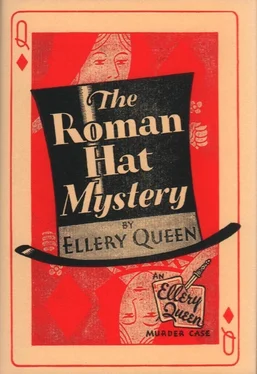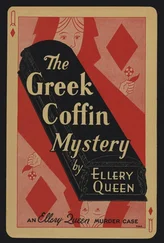At the Inspector’s sudden gesture all became silent as the grave. Sampson, looking about him at the bright chandeliers and lights, the deserted theatre, the lowered curtain, could not help feeling that the stage was being set for dramatic revelations. He leaned forward interestedly. Panzer and Neilson were quiet and watchful. Djuna kept his eyes fixed on the old man.
“Ladies and gentlemen,” Queen announced curtly, staring at the assembled company, “I’ve brought you here for a definite purpose. I will not keep you any longer than is absolutely necessary, but what is necessary and what is not necessary is entirely up to me. If I find that I do not receive what I consider truthful answers to my questions, everybody will stay here until I am satisfied. I want that thoroughly understood before we proceed.”
He paused and glared about. There was a ripple of apprehension, a sudden crackle of conversation which died as quickly as it was born.
“On Monday night,” continued the Inspector frostily, “you people attended the performance at this theatre and, with the exception of certain employees and others now seated at the rear, occupied the seats in which you now find yourselves.” Sampson grinned as he noticed the stiffening of backs at these words, as if each individual felt his seat grow suddenly warm and uncomfortable beneath him.
“I want you to imagine that this is Monday night. I want you to think back to that night and try to remember everything that happened. By everything I mean any occurrence, no matter how trivial or apparently unimportant, that might have left an impression on your memory...”
As the Inspector warmed to his words, a number of people drifted into the orchestra at the rear. Sampson greeted them in whispers. The little party was composed of Eve Ellis, Hilda Orange, Stephen Barry, James Peale and three or four other members of the cast of “Gunplay.” They were dressed in their street clothes. Peale whispered to Sampson that they had just come from their dressing rooms and had dropped into the auditorium on hearing voices.
“Queen’s holding a little powwow,” whispered Sampson in return.
“Do you think the Inspector has any objections to our staying a while and listening?” asked Barry in a low tone, with an apprehensive glance toward the Inspector, who had stopped and was staring icily in their direction.
“Don’t see why—” began Sampson worriedly, when Eve Ellis murmured, “Shhh!” and they all became silent.
“Now —” said the Inspector venomously, when the flurry had subsided, “this is the situation. Remember, you are now back in Monday evening. The curtain has gone up on the second act and the theatre is dark. There is a lot of noise from the stage and you are intent on the exciting sequences of the play... Did any of you, especially those sitting in the aisle seats, notice anything peculiar, unusual or disturbing around or near you at that time?”
He paused expectantly. There were puzzled, fearful shakings of the head. No one answered.
“Think hard,” growled the Inspector. “You remember on Monday night I went down this aisle and questioned all of you in the same vein. Naturally I don’t want lies, and I can’t reasonably expect that you will tell me something startling now when you could remember nothing Monday night. But this is a desperate situation. A man was murdered here and we are frankly up against it. One of the most difficult cases we have ever encountered! In the light of such a condition, when we find ourselves against a blank wall with not the slightest idea where to turn — I am being honest with you as I expect you to be with me — I must turn to you as the only members of the audience five nights ago who were in a position to see something important, if anything important occurred... It has been my experience that often, under stress of nervousness and excitement, a man or woman will forget a little detail that returns to memory after a few hours, days, weeks of normalcy. It is my hope that something of the sort has taken place with you...”
As Inspector Queen spoke, the words dropping acidly from his lips, the company lost its nervousness in its fascinated interest. When he paused, people put their heads together and whispered excitedly, shaking their heads at times, arguing in fierce, low tones at others. The Inspector waited in a resigned patience.
“Raise your hands if you have something to tell me...” he said.
A woman’s timid white hand fluttered aloft.
“Yes, madam?” commanded Queen, pointing his finger. “Do you recall anything unusual?”
A withered old lady rose embarrassedly to her feet and began to stammer in a squeaking voice. “I don’t know whether it’s important or not, sir,” she said tremulously. “But I do remember some time during the second act a woman, I think it was, walking down the aisle and a few seconds later walking up again.”
“Yes? That’s interesting, madam,” commented the Inspector. “About what time was this — can you recall?”
“I don’t remember the time, sir,” shrilled the old lady, “but it was about ten minutes or so after the beginning of the act.”
“I see... And do you recall anything of her appearance? Was she young or old? What did she wear?”
The old lady looked troubled. “I don’t exactly remember, sir,” she quavered. “I wasn’t paying—”
A high, clear voice interrupted from the rear. Heads twisted about. Madge O’Connell had jumped to her feet.
“You don’t have to mess around with that any more, Inspector,” she announced coldly. “That lady saw me walking down the aisle and back again. That was before I — you know.” She winked pertly in the Inspector’s direction.
People gasped. The old lady stared with pitiful bewilderment at the usherette, then at the Inspector and finally sat down.
“I’m not surprised,” said the Inspector quietly. “Well, anybody else?”
There was no answer. Realizing that the company might feel shy of announcing their thoughts in public Queen started up the aisle, working from row to row, questioning each person separately in tones inaudible to the rest. When he had finished he returned slowly to his original position.
“I see that I must allow you ladies and gentlemen to return to your peaceful firesides. Thank you very much for your help... Dismissed!”
He flung the word at them. They stared at him dazedly, then rose in muttering groups, took up their coats and hats and under Velie’s stern eye began to file out of the theatre. Hilda Orange, standing in the group behind the last row, sighed.
“It’s almost embarrassing to see that poor old gentleman’s disappointment,” she whispered to the others. “Come on, folks, let’s be going, too.”
The actors and actresses left the theatre among the departing company.
When the last man and woman had disappeared, the Inspector marched back up the aisle and stood gloomily staring at the little group who were left. They seemed to sense the seething fire in the old man and they cowered. But the Inspector, with a characteristic lightning change of front, became human again.
He sat down in one of the seats and folded his arms over the back, surveying Madge O’Connell, Parson Johnny and the others.
“All right, folks,” he said in a genial tone. “How about you, Parson? You’re a free man, you don’t have to worry about silks any more and you can speak up now like any self-respecting citizen. Can you give us any help in this affair?”
“Naw,” grunted the little gangster. “I told you all I knew. Ain’t got a thing to say.”
“I see... You know, Parson, that we’re interested in your dealings with Field.” The gangster looked up in shocked surprise. “Oh, yes,” continued the Inspector. “We want you to tell us sometime about your business with Mr. Field in the past. You’ll keep that in mind, won’t you?... Parson,” he said sharply, “who killed Monte Field? Who had it in for him? If you know — out with it!”
Читать дальше












